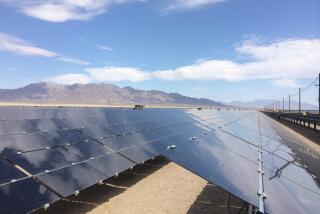Powered by optimism
- Share via
Imagine a hedonistic energy future where fuel is ever plentiful, ever more energy is consumed with “bacchanalian delight,” and waste turns out to be virtuous. Too good to be true? That’s what’s forecast in the provocative, though not well-reasoned, book, “The Bottomless Well,” by Peter Huber, a “hard” environmentalist at the conservative Manhattan Institute, and Mark Mills, a technology investment promoter who was a staff consultant to the Reagan White House science office.
Public debate on energy gets colored by overstatement; energy has a mystical quality for many people who treat it as the key to the universe. The central dogma of their book is “the paradox of efficiency” -- that energy efficiency leads to more consumption, not less.
How is that possible? If efficiency “makes what we ultimately consume cheaper,” they argue, then the lower cost “almost always increases consumption.” Consider how much more gas you would buy if it cost a buck a gallon instead of more than $2.
Huber and Mills’ aggressive manifesto contends that continuing scientific advancement will lead only to new ways of harnessing energy, finding new forms and leaving behind those fears that we are using up our future at the expense of present consumption. “We will want more, much more,” they claim. “And we will get it, easily. Unless, somehow, our optimism, drive, courage and will give way to lethargy and fear.” It becomes a confidence game.
The authors consider various technologies developed through the years, such as steam engines and electric turbines, in an evolutionary way -- each form finds its place on a spectrum of “purification” from fuel to energy to “bits.” They say we’re now at the highest end of this spectrum, a new age of “digital power,” the power of human logic over creation -- power that is so efficient that it can turn “the energy economy” virtually into a “perpetual-motion” machine requiring little fuel.
“The Bottomless Well” falls glaringly short in recognizing the pitfalls along the way to energy nirvana. Though the authors wax eloquent about every conceivable engineering improvement, they downplay economics and prices. They ignore the cost of efficiency and the sensitivity of consumption to that cost. They also ignore human satiation. All of these can spell the death of some technological innovations, like the Concorde supersonic jetliner.
Huber and Mills also overlook the business cycle. The big, expensive hardware they promote for “converting” fuel has to be paid for upfront as capital investment. They claim that “as a direct result [of ever bigger generating plants] electricity has grown steadily cheaper,” but what about the high prices triggered when big nuclear facilities came on line in the 1980s? That prompted deregulation and resulted in the use of newly developed, small gas-fired turbines and lower prices.
Bigger isn’t really cheaper after all. In fact, large generators are less reliable than smaller local ones because there’s more of a risk of overloading transmission lines from these big remote units. Another cheaper alternative is demand-reduction programs, which are attacked by the authors for needing a long lead time (even though their favored big generating projects need this too).
Huber and Mills tell only half the story of why waste occurs when energy is created. For them, waste is virtuous because it is the energy that gets lost in the process of attaining a higher, more purified form of energy. Burning coal to power a steam turbine, for example, also results in the release of heat. But waste is also a measure of inefficiency that creates demand: A less efficient refrigerator just wastes energy, and there’s no virtue to be found in this.
Despite their exuberance about a future of unlimited power, the authors present a graph in their book that shows that the growth rate of energy consumption has been declining since the 1970s. They betray a bit of philosophical pessimism when they write, “We crave energy because we crave order.” If we don’t consume energy, then, the universe will head into chaos? According to chemist Frank L. Lambert, emeritus professor at Occidental College, there is no tendency of “things” toward disorder -- only a tendency for concentrated energy to spread out. Order is the result of how energy (and how much of it) is dispersed. So, the national energy debate is no more an Armageddonesque struggle than it should be a forum to hype oversupply. *
More to Read
Sign up for our Book Club newsletter
Get the latest news, events and more from the Los Angeles Times Book Club, and help us get L.A. reading and talking.
You may occasionally receive promotional content from the Los Angeles Times.










